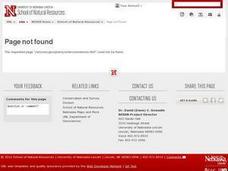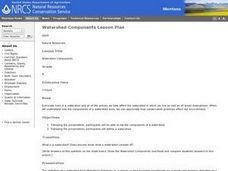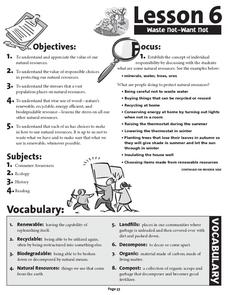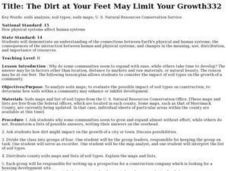Curated OER
Natural Resources: Can We Use Them Forever? Grade 2
Bright colors and animation are great ways to attract a young students attention. Students are introduced to the concepts of renewable and non-renewable resources as they pose the question, will our resources be around forever? This...
Curated OER
Water Pollution
Examine water pollution and legislation through this reading comprehension worksheet, intended to correspond with a specific text but valuable even without it. Learners read 10 sentences, unscrambling the bold word to complete each (i.e....
Curated OER
Soil Erosion Demonstrations
Young scholars conduct experiments demonstrating soil erosion and the benefits of conservation practices. Working in groups, they use topsoil and sand in shallow boxes as models to examine the effects of water on soil and sand with and...
Curated OER
Amazing Grazing: Keeping Our Ecosystem Running
Students discover the value of sustainability within our ecosystem. In this ecological lesson, students discuss the importance of a food cycle in our society, and how humans can improve the conservation of a healthy ecosystem. Eventually...
Curated OER
FDR's Tree Army: The Civilian Conservation Corps
In this primary source analysis worksheet, students analyze the a short documentary video clip about the CCC. Students respond to 3 short answer questions about the documentary.
Curated OER
Conservation Issues
Pupils discover the relationship among living things in an ecosystem. They identify the impact of environmental changes on animals and how to protect them. They work together to create an informational brochure.
Curated OER
Erosion Explosion
Ninth graders explore soil erosion. Through a class discussion, they examine soil conservation methods. Given a potted plant, 9th graders observe the effects of erosion when water is poured over the soil. Students brainstorm terms...
Curated OER
Watershed Components
Eighth graders examine the components of a watershed. They view overheads, discuss the hydrologic cycle, and observe a demonstration of a soil erosion box.
Curated OER
Waste Not Want Not
Students are introduced to the need to save natural resources. Through inquiry, hands-on activities, and problem solving, students increase their understanding of solid waste materials and the need to reduce, recycle, and reuse.
Curated OER
What happens to water before we use it?
Students examine how water is treated prior to becoming available for human consumption. In this water treatment activity, students conduct an experiment in which they filter water. Students formulate a hypothesis, test, analyze data,...
Curated OER
They're Tilling that Field Behind the Mall
Unfortunately, the article for which this resource was written is not available. You can, however, find another current document on agriculture and urban development for your class to read together, and then still follow the suggested...
Curated OER
Dishing the Dirt Part 1
Students create a soil center on their school grounds. They begin to write in their science journals. They participate in an experiment that helps the community begin their own gardens.
Curated OER
Dishing the Dirt Part 2
Students explore the differences between specific soil characteristics. They participate in an experiment in which they discover soil texture. They write their observations in a journal.
Curated OER
Erosion
Fifth graders engage in some activities that will help them to identify erosion and explain the causes of erosion. They also look into ways that humans can slow the process of erosion in some cases. After a teacher-led demonstration,...
Alabama Learning Exchange
WATER You Doing to Help?
Auntie Litter is here to educate young scholars about water pollution and environmental stewardship! Although the 15-minute video clip is cheesy, it's an engaging look at the water cycle and conservation. Learners start by illustrating...
Texas State Energy Conservation Office
Global Climate Change
Here is an extensive reading resource that addresses our climate change crisis. It thoroughly explains the greenhouse effect, related Earth cycles, and the history of climate change. Use it as part of the intended unit, published by the...
Indian Land Tenure Foundation
Relationships to Places
Young historians take a look at how the Indian tribes of California promoted a mindful relationship between people and the land. They begin to understand how the Indians were champions of conservation, and at preserving the natural...
Curated OER
Outdoor Education
Learners participate in various outdoor activities to teach them about the environment. In this outdoor education lesson plan, students participate in activities such as compass direction, conservation, forestry, wildlife, and...
Curated OER
The Dirt at Your Feet May Limit Your Growth
Students examine how soils within a community may enhance or inhibit development. In small groups, they analyze county soils maps, and develop a prospectus for a construction company looking to construct a housing development site.
Curated OER
Science with Mud!
Eighth graders give some examples of chemical reactions they see everyday. In this chemistry lesson, 8th graders investigate how much water soil can hold. They collect data and compare results with others.
Curated OER
Off to Camp We Go!
Learners research the Civilian Conservation Corp camps. In this Civilian Conservation Corps camp, students explore the C. C. C. and Franklin Delano Roosevelt. They plan and develop a three dimensional representation of life in a C. C. C....
Safe Drinking Water Foundation
Demonstration of Water Pollution
In this teacher-led demonstration, your young environmentalists will observe and record how different types of water pollutants look when they are combined. From here, individuals will develop a hypothesis on how the water can be...
Safe Drinking Water Foundation
Types of Water Pollution
In groups, young environmentalists investigate water samples that are contaminated with different types of pollutants. Each group presents their findings to the class and fills out the "Types of Pollutants Chart." This lesson is meant...
Curated OER
Renewable vs. Non-Renewable Resources
Here's a fine activity on renewable and non-renewable sources of energy for your 5th graders. In it, learners list a number of natural resources on the board, then try to sort the resources into appropriate categories. This helps them to...

























